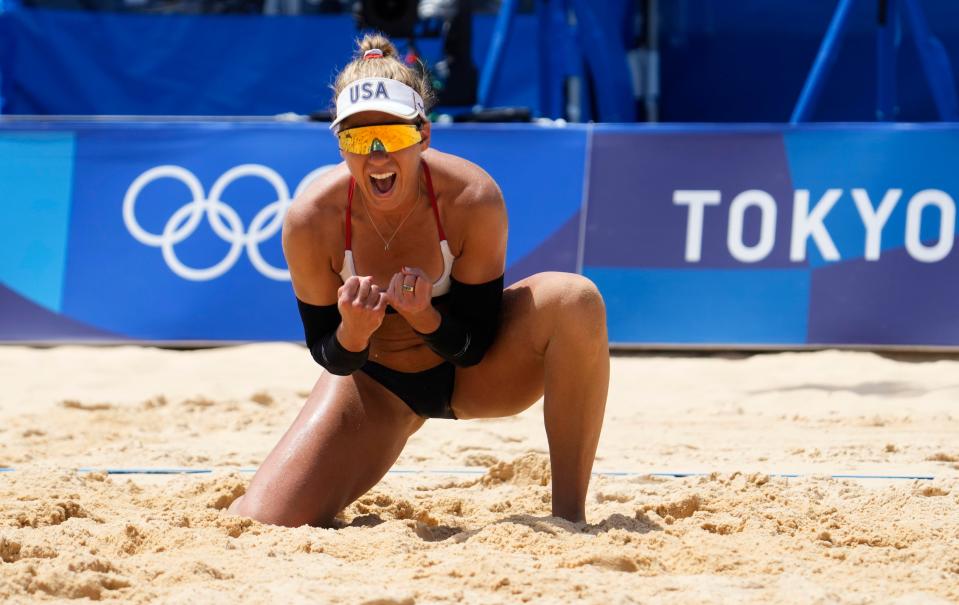Opinion: April Ross puts US back on top of women's beach volleyball with Olympic gold
TOKYO — The U.S. rise back to the top of women’s beach volleyball took 44 minutes or nine years, depending on how you’re counting.
On another scorching day at the Summer Olympics, where temperatures reached well over 100 degrees as the Americans and Australians played for the gold medal around lunchtime Friday, the U.S. team of April Ross and Alix Klineman — the aptly-named “A Team" — took control of the match from the get-go, defeating Australians Mariafe Artacho del Solar and Taliqua Clancy, 21-15, 21-16, in considerably less than an hour.
The quick work by the Americans made it unnecessary to spend one more second under the hot sun, sending all duly convinced observers scurrying for the air conditioning, but the truth is, there had been quite a wait for that majestic U.S. moment in the Tokyo sand.
The Americans won their fourth gold medal in five Olympics dating to the 2004 Athens Olympics, but their first since 2012 in London. And, for the first time ever, Misty May-Treanor and Kerri Walsh Jennings were not the ones standing on the top of the medal stand.

American beach volleyball had hit the refresh button, but with a most worthy soul as its new hero.
“It means a lot to uphold that tradition,” the 39-year-old Ross said afterward, having finally added a gold medal to her silver in 2012 and bronze in 2016 to complete the set.
“It wasn’t easy. The world is so good at beach volleyball now and so many different countries are putting a lot of resources into their beach volleyball teams and the level is ridiculously high.”
Ross’ three medals came with three different partners, which speaks volumes about her ability to adapt under pressure. The silver in London was won with Jennifer Kessy, the bronze in Rio with Walsh Jennings and Friday’s gold with the 6-5 Klineman, a former indoor volleyball standout at Stanford who wasn’t even playing beach volleyball until 2017.
“I can’t fathom that it worked out the way it did,” Ross said. “It’s kind of a fairytale story. Like, oh, I’m going at 39 to try and get my gold medal and the fact that it actually happened feels so special and surreal.”
Klineman, 31, stood beside Ross, towering over her by a good four inches, as Ross marveled at their serendipitous journey.
“I’m so proud of my other ones,” Ross said of her previous Olympic medals, “but just how this worked out and the risk that Alix took to come out to the beach and all her hard work, it doesn’t happen without that.”
Beach volleyball was one of the original edgy sports brought into the Olympic fold at the 1996 Atlanta Games by the old guard at the International Olympic Committee to try to juice up new interest in a tradition-bound TV property.
In those early years, there was an inclination to not take the sport entirely seriously because of the sexualization of the terrific, but obviously scantily clad, female athletes.
That issue still exists, but the fact is, with each gold medal the Americans won, a sports nation started to respect those athletes even more.
Over the past couple of years, the Ross-Klineman pairing turned from one big gamble to one of the most enduring U.S. teams in any sport at these Olympics.
Clearly, a fun sport has given us some very serious athletes, and finally given one of the greatest of all time her well-deserved gold medal.
This article originally appeared on USA TODAY: 2021 Olympics: April Ross puts US on top of women's beach volleyball

